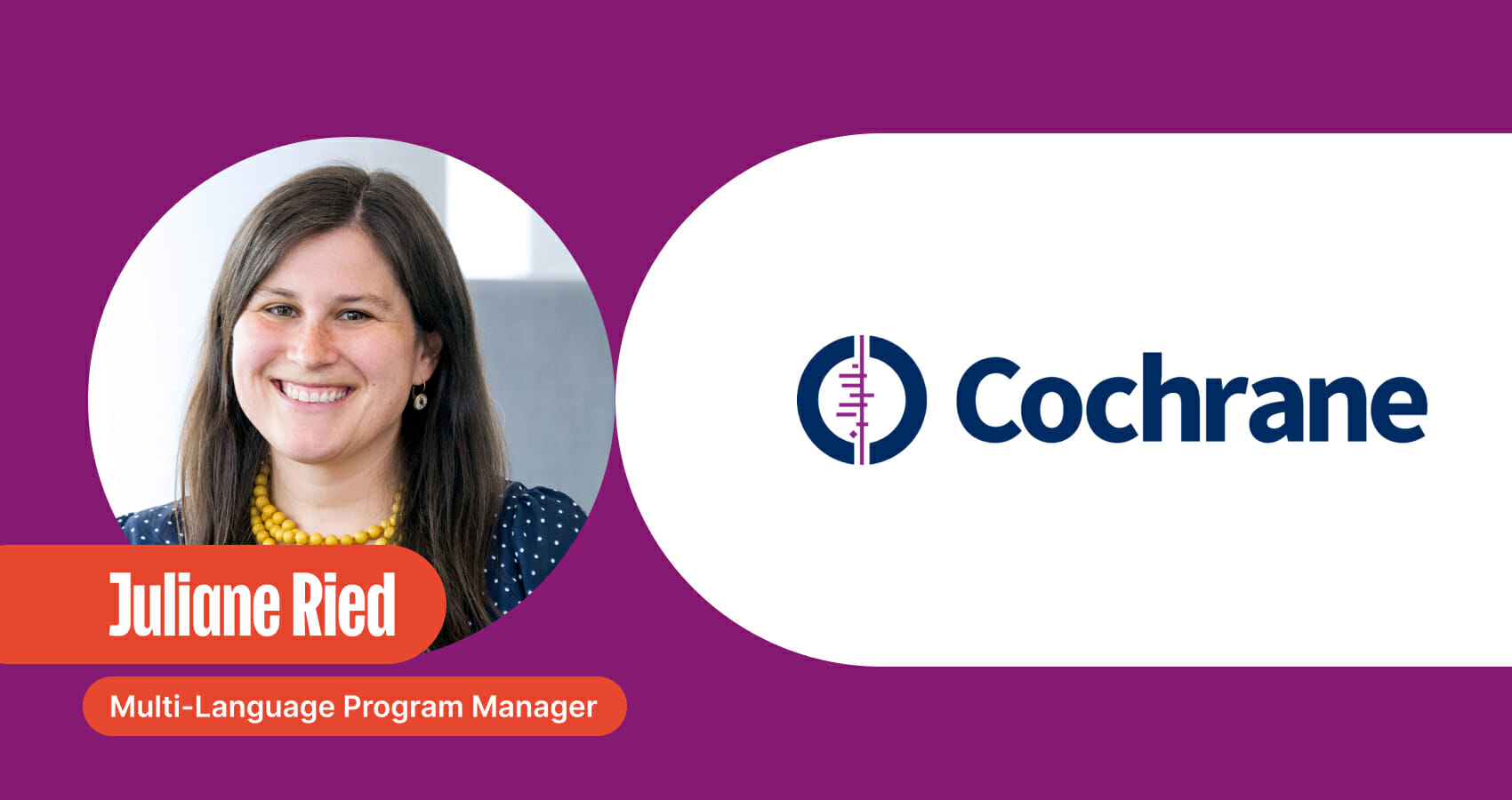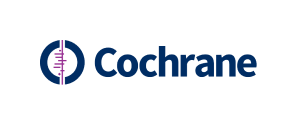Enabling Informed Decisions for Healthcare Globally

Cochrane is a global, independent, not-for-profit network that collects, assesses, and summarizes health research and publishes it as research articles, so called systematic reviews. Cochrane has published more than 8,000 systematic reviews and also updates them regularly as new research becomes available. Cochrane reviews aim to help people make informed choices about their health and to improve healthcare globally.
Challenge
The scope
Cochrane translates from English into 15 languages and works with a network of 1000+ translators, mostly volunteers with a professional background in healthcare. Fifteen local teams manage the translators and the workflows for their languages, for example, Cochrane China coordinates Simplified Chinese translations.
Cochrane publishes about 100 new and updated health research articles per month, and mainly translates summaries of those articles. Articles are stored as XML files in their in-house database. Each team selects health topics most relevant to their local context. In total, they translate up to 1,000 health research summaries per month across the 15 languages, which equals about 1 million words. They also translate the cochrane.org website, which is built in the Drupal CMS (content management system).
Being neither an LSP (language service provider) nor a translation buyer, Cochrane is not a typical industry player. With their unique set up, it is essential that the translation system, editor, workflows, and notifications are intuitive and supportive. It’s also important to have an easy way to provide clear feedback to translators.
Since the teams’ capacity is limited, they prioritize the health topics that are most important for them locally and priorities vary in different parts of the world, for example, malaria is more common in some regions than in others. Therefore all source content needs to be accessible to all language teams, but they don’t actually translate all content. It also means a lot of content remains untranslated in Phrase TMS for a long time, or until it is deleted automatically after 12 months.
“We use up our Phrase TMS word count without actually translating all of what we pay for, because we don’t know upfront which language team will translate what. We want to ensure our teams can select and translate the health topics that are most important for their local audiences, but these are decisions that cannot be easily automated.” Juliane Ried, Multi-language Program Manager at Cochrane says.
Additional challenges:
- While some volunteers translate a lot and on a regular basis, other volunteers translate little and take longer to complete their assignments.
- Cochrane content is very specialized, and even professional translators specialized in health need training to be able to translate it accurately.
- Translators need to see the full coherent document in the correct order (not just incoherent segments) and have context available.
- As translation work is decentralized and managed locally by language, translator and project management permissions need to be limited by language. For example, a French project manager should not have access to Thai content and users.
Solution
A fully featured solution free of charge—Phrase TMS
Overall, Cochrane needs a lot of flexibility from a translation management system. That’s where Phrase TMS comes in. Cochrane makes extensive use of integrations and automation to optimize their translation workflow. After 6 weeks of development, Cochrane set up three integrations building on the API setup from their previous solution.
Research articles integration
In terms of volume, the research articles integration is the biggest. Cochrane has a REST API connection with their in-house database and Phrase TMS. XML source files are sent to Phrase TMS automatically for each locale whenever a new English article is published or updated. One project is created for each language and access to the projects is limited through the Business Unit function, so that project managers only see the projects for their own language. Cochrane uses Project Templates in Phrase TMS to specify which sections of the articles should be translated for which locale. They also send XSL context and make use of other settings in the Project Template feature. To get the articles back into the system they listen to webhooks for job status change. When jobs are completed in the last workflow step, they are sent back to the in-house database and published automatically.
Cochrane.org website integration
The website integration is similar to the research article set up. Cochrane has a REST API connection between their Drupal CMS and Phrase TMS, this time using XML and JSON files.
They also added a custom-built function for web editors to send English source files to Phrase TMS for all or selected languages when they publish or update English web pages in Drupal. Again, they distinguish jobs by language and listen to webhooks job status change to fetch completed jobs.
User integration
All Cochrane contributors have a Cochrane account, which they use for all activities they may undertake in Cochrane in different software. Cochrane has set up an API connection with their in-house database using single sign-on. They have also set up a custom login where users log into Phrase TMS with their Cochrane account. When the Phrase TMS accounts are created, roles and languages are assigned and updated based on Cochrane account details.
Machine translation
All language teams have access to machine translation (MT) as part of their workflows. Cochrane uses DeepL for all supported languages, and Google Translate for other languages, and is exploring custom MT options and other MT offers to replace Google Translate. Some languages always use MT as a basis and post-edit, others leave it up to their volunteers to use it or not. Cochrane doesn’t publish un-edited MT, as it is critical that the translations are accurate, since wrong translations could provide incorrect health information.
At Cochrane, we find Phrase TMS is flexible and has adaptable functionality that can probably meet very diverse use and business cases. There is constant development of functionalities, good support, and nice people that try to understand your needs and help you find the best solutions.

Benefits
Reduced workload for project managers
Phrase TMS enables Cochrane to have fully automated data processing as it completely removes the need for project managers or translators to send documents manually. This is important for managing large volumes and reduces PM workload. File formatting and processing issues are also reduced. Thanks to the cloud, project managers and translators mostly work in one place, and there is little need for them to leave Phrase TMS. Overall, Phrase TMS speeds up the translation process through translation memory, machine translation, and automatic data handling, which enables Cochrane to translate more and faster.